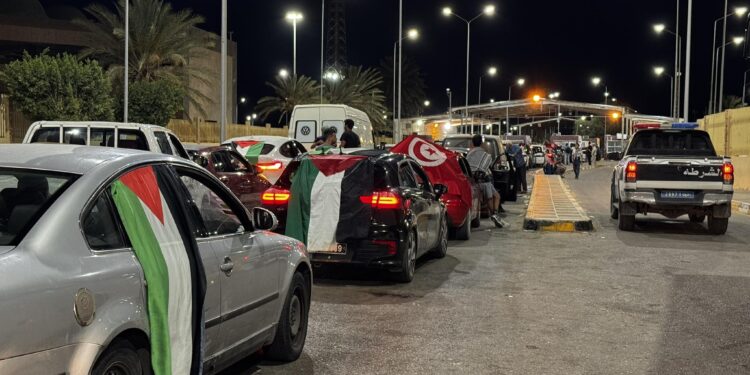As Tunisia sinks deeper into a severe political, social, and economic crisis under the authoritarian rule of President Kaïs Saïed, the regime is increasingly redirecting public attention outward. Starting this Monday, nearly 1,000 young Tunisians are set to participate in a so-called solidarity caravan, « Essoumoud, » aimed at reaching the Egyptian-Palestinian border. The highly publicized initiative has raised eyebrows, not only due to its timing, but also over concerns about potential antisemitic and anti-Israel undertones.
Presented as an act of solidarity with Gaza, the caravan appears primarily to serve as a propaganda tool for a regime desperate for popular legitimacy. While individual freedoms are in retreat, the opposition silenced, trade unions suppressed, and young Tunisians fleeing en masse across the Mediterranean, the government is attempting to craft an image of internal resistance and ideological commitment.
At a press conference held at the UGTT headquarters—an institution itself under government pressure—the organizers announced that around 1,000 participants, mostly youth, would set off at 6 a.m. on Monday from Avenue Habib Bourguiba.
“This is a respectable number,” stated Nabil Chenoufi, spokesperson for the caravan, while admitting that many applicants were turned away for “logistical reasons”—a diplomatic way of saying the regime intends to maintain tight control over the event.
The caravan is scheduled to pass through several cities—Sousse, Sfax, Gabès, Médenine—before reaching Ben Guerdane near the Libyan border, and from there, attempting to reach Rafah via Libya. While symbolically loaded, the route’s actual goal remains unclear. Break the Gaza blockade from Tunisia? A media stunt lacking tangible impact, and one that disregards the geopolitical and security complexities of the region.
Meanwhile, Tunisians are grappling with shortages of basic goods, a plummeting dinar, harsh judicial repression of dissent, and a disillusioned youth with neither employment nor prospects.
By promoting this operation with nationalist slogans and rhetoric about resistance against Israel and the Jewish people—often in coordination with Algeria’s military regime—the Saïed government seems intent on redirecting social anger toward an external cause. It’s a classic tactic of authoritarian regimes: inventing a common enemy or embracing a noble cause to mask internal failure.
The Palestinian cause thus becomes a convenient pretext. Solidarity loses all credibility when it is instrumentalized by a regime that, at the same time, crushes its own citizens.

